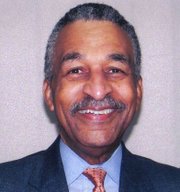(NNPA) — “In the Northern states, we are not slaves to individuals, not personal slaves, yet in many ways we are slaves of the community…It is more than a figure of speech to say that we are a people chained together. We are one people – one in general complexion type, one in degradation, one in popular estimation. As one rises, all must rise, and as one falls all must fall. Having now, our feet on the rock of freedom, we must drag our brethren from the slimy depths of slavery, ignorance, and ruin. Every one of us should be ashamed to consider himself free, while his brother is a slave.” Frederick Douglass
One conclusion I have drawn from working in the collective economic empowerment vineyard for years is that “We” fail because “I” gets in the way. Black folks adore the statement, “I am because we are, and because we are, therefore, I am.” Oh, if we would live by that statement rather than merely recite it. Frederick Douglass and other ancestors knew they were all in this thing together, and that no Black man or woman would rise without the rest of us rising. Have we come so far since his time that we no longer believe in the collective? Have we achieved so much and risen so high as individuals that we have lost sight of our brothers and sisters?
James Clingman
Considering how we are so into words these days, I thought it appropriate to offer a change in how we perceive and use the word “We.” Each of us should adopt the thought that there is an “I” in “We” and realize, as our forefathers and mothers did, no matter the level of anyone’s individual success, he or she is still included in the “We.” That way we can eliminate much of the ego that tends to separate us from one another.
The “I,” when it stands alone, is dangerous. It is rife with self-aggrandizement, self-delusion, vulnerability, and sometimes self-destruction due to its tendency to make an individual think his or her success was obtained without the help of anyone else. But add the “I” to the word “We” and watch what happens. The “I” is still successful, and it uplifts the “We” by its individual success.
The “We” is strong. It overflows with self-reliance, self-determination, love, trust, respect, and cooperation. The collective aspects of success, whether one person attains it or everyone in the group attains it, fills the “We” with pride and the “I” with strength to do even more. Thus, I would assert to you that there is an “I” in the word, “We;” it’s a small “i” and it’s silent.
The “I” is silent, not in the sense that it never speaks out or never does anything for itself as an individual, but rather it appreciates and respects the “We” so much that it is willing to make individual sacrifices to uplift the “We.” Just as Frederick Douglass said, “As one rises, all must rise…” He understood his obligation to his people and acted upon it, irrespective of the fact that he had attained tremendous success and was “accepted” in social and political circles in which his brothers and sisters were rejected. Jackie Robinson said, “We might make it as individuals, but I think we have to be concerned about the masses of [Black] people.” Both men understood the inside-outside game quite well.
While Douglass was unwilling to do what Harriet Tubman and John Brown did, he knew Black people needed a spokesperson, a protest organ, and he was not afraid to tell it like it was and speak truth to power, as he did in his newspaper, The North Star and his famous July 4th speech: “What is it to me?” he asked. Although Douglass was an “inside” man, he heaped praise on “outsider,” Harriet Tubman, in a written tribute to her: “I have had the applause of the crowd and the satisfaction of being approved by the multitude, while the most that you have done has been witnessed by a few trembling, scarred, foot-sore bondmen and women, whom you have led out of the house of bondage.”
The inside-outside strategy worked well for those two stalwarts and with many other historical figures. What about us today? Are those on the inside so comfortable that they think they are not vulnerable to the same treatment the outsiders are receiving? Are the outsiders so envious of the “success” of the insiders that they spend their waking hours trying to bring the insiders down?
If we adopt the notion that there is, indeed, an “i” in “We,” the battles Black people are fighting in this country will be won. Group ego beats individual ego any day. To remind us, let’s change the spelling of “We” to “Wie.”
Jim Clingman, founder of the Greater Cincinnati African American Chamber of Commerce, is the nation’s most prolific writer on economic empowerment for Black people. He can be reached through his website, blackonomics.com. He is the author of Black Dollars Matter: Teach Your Dollars How to Make More Sense, which is available through his website; professionalpublishinghouse.com and Amazon Kindle eBooks.

